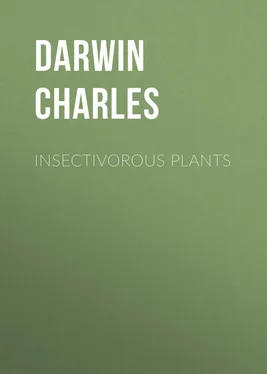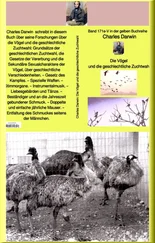Charles Darwin - Insectivorous Plants
Здесь есть возможность читать онлайн «Charles Darwin - Insectivorous Plants» — ознакомительный отрывок электронной книги совершенно бесплатно, а после прочтения отрывка купить полную версию. В некоторых случаях можно слушать аудио, скачать через торрент в формате fb2 и присутствует краткое содержание. Жанр: foreign_antique, foreign_prose, на английском языке. Описание произведения, (предисловие) а так же отзывы посетителей доступны на портале библиотеки ЛибКат.
- Название:Insectivorous Plants
- Автор:
- Жанр:
- Год:неизвестен
- ISBN:нет данных
- Рейтинг книги:5 / 5. Голосов: 1
-
Избранное:Добавить в избранное
- Отзывы:
-
Ваша оценка:
- 100
- 1
- 2
- 3
- 4
- 5
Insectivorous Plants: краткое содержание, описание и аннотация
Предлагаем к чтению аннотацию, описание, краткое содержание или предисловие (зависит от того, что написал сам автор книги «Insectivorous Plants»). Если вы не нашли необходимую информацию о книге — напишите в комментариях, мы постараемся отыскать её.
Insectivorous Plants — читать онлайн ознакомительный отрывок
Ниже представлен текст книги, разбитый по страницам. Система сохранения места последней прочитанной страницы, позволяет с удобством читать онлайн бесплатно книгу «Insectivorous Plants», без необходимости каждый раз заново искать на чём Вы остановились. Поставьте закладку, и сможете в любой момент перейти на страницу, на которой закончили чтение.
Интервал:
Закладка:
AS we have seen that nitrogenous fluids act very differently on the leaves of Drosera from non-nitrogenous fluids, and as the leaves remain clasped for a much longer time over various organic bodies than over inorganic bodies, such as bits of glass, cinder, wood, &c., it becomes an interesting inquiry, whether they can only absorb matter already in solution, or render it soluble, – that is, have the power of digestion. We shall immediately see that they certainly have this power, and that they act on albuminous compounds in exactly the same manner as does the gastric juice of mammals; the digested matter being afterwards absorbed. This fact, which will be clearly proved, is a wonderful one in the physiology of plants. I must here state that I have been aided throughout all my later experiments by many valuable suggestions and assistance given me with the greatest kindness by Dr. Burdon Sanderson.
It may be well to premise for the sake of any reader who knows nothing about the digestion of albuminous compounds by animals that this is effected by means of a ferment, pepsin, together with weak hydrochloric acid, though almost any acid will serve. Yet neither pepsin nor an acid by itself has any such power. 18 18 It appears, however, according to Schiff, and contrary to the opinion of some physiologists, that weak hydrochloric dissolves, though slowly, a very minute quantity of coagulated albumen. Schiff, 'Phys. de la Digestion,' tom. ii. 1867, p. 25.
We have seen that when the glands of the disc are excited by the contact of any object, especially of one containing nitrogenous matter, the outer tentacles and often the blade become inflected; the leaf being thus converted into a temporary cup or stomach. At the same time the discal glands secrete more copiously, and the secretion becomes acid. Moreover, they transmit some influence to the glands of the exterior tentacles, causing them to pour forth a more copious secretion, which also becomes acid or more acid than it was before.
As this result is an important one, I will give the evidence. The secretion of many glands on thirty leaves, which had not been in any way excited, was tested with litmus paper; and the secretion of twenty-two of these leaves did not in the least affect the colour, whereas that of eight caused an exceedingly feeble and sometimes doubtful tinge of red. Two other old leaves, however, which appeared to have been inflected several times, acted much more decidedly on the paper. Particles of clean glass were then placed on five of the leaves, cubes of albumen on six, and bits of raw meat on three, on none of which was the secretion at this time in the least acid. After an interval of 24 hrs., when almost all the tentacles on these fourteen leaves had become more or less inflected, I again tested the secretion, selecting glands which had not as yet reached the centre or touched any object, and it was now plainly acid. The degree of acidity of the secretion varied somewhat on the glands of the same leaf. On some leaves, a few tentacles did not, from some unknown cause, become inflected, as often happens; and in five instances their secretion was found not to be in the least acid; whilst the secretion of the adjoining and inflected tentacles on the same leaf was decidedly acid. With leaves excited by particles of glass placed on the central glands, the secretion which collects on the disc beneath them was much more strongly acid than that poured forth from the exterior tentacles, which were as yet only moderately inflected. When bits of albumen (and this is naturally alkaline), or bits of meat were placed on the disc, the secretion collected beneath them was likewise strongly acid. As raw meat moistened with water is slightly acid, I compared its action on litmus paper before it was placed on the leaves, and afterwards when bathed in the secretion; and there could not be the least doubt that the latter was very much more acid. I have indeed tried hundreds of times the state of the secretion on the discs of leaves which were inflected over various objects, and never failed to find it acid. We may, therefore, conclude that the secretion from unexcited leaves, though extremely viscid, is not acid or only slightly so, but that it becomes acid, or much more strongly so, after the tentacles have begun to bend over any inorganic or organic object; and still more strongly acid after the tentacles have remained for some time closely clasped over any object.
I may here remind the reader that the secretion appears to be to a certain extent antiseptic, as it checks the appearance of mould and infusoria, thus preventing for a time the discoloration and decay of such substances as the white of an egg, cheese, &c. It therefore acts like the gastric juice of the higher animals, which is known to arrest putrefaction by destroying the microzymes.
[As I was anxious to learn what acid the secretion contained, 445 leaves were washed in distilled water, given me by Prof. Frankland; but the secretion is so viscid that it is scarcely possible to scrape or wash off the whole. The conditions were also unfavourable, as it was late in the year and the leaves were small. Prof. Frankland with great kindness undertook to test the fluid thus collected. The leaves were excited by clean particles of glass placed on them 24 hrs. previously. No doubt much more acid would have been secreted had the leaves been excited by animal matter, but this would have rendered the analysis more difficult. Prof. Frankland informs me that the fluid contained no trace of hydrochloric, sulphuric, tartaric, oxalic, or formic acids. This having been ascertained, the remainder of the fluid was evaporated nearly to dryness, and acidified with sulphuric acid; it then evolved volatile acid vapour, which was condensed and digested with carbonate of silver. "The weight of the silver salt thus produced was only .37 gr., much too small a quantity for the accurate determination of the molecular weight of the acid. The number obtained, however, corresponded nearly with that of propionic acid; and I believe that this, or a mixture of acetic and butyric acids, were present in the liquid. The acid doubtless belongs to the acetic or fatty series."
Prof. Frankland, as well as his assistant, observed (and this is an important fact) that the fluid, "when acidified with sulphuric acid, emitted a powerful odour like that of pepsin." The leaves from which the secretion had been washed were also sent to Prof. Frankland; they were macerated for some hours, then acidified with sulphuric acid and distilled, but no acid passed over. Therefore the acid which fresh leaves contain, as shown by their discolouring litmus paper when crushed, must be of a different nature from that present in the secretion. Nor was any odour of pepsin emitted by them.
Although it has long been known that pepsin with acetic acid has the power of digesting albuminous compounds, it appeared advisable to ascertain whether acetic acid could be replaced, without the loss of digestive power, by the allied acids which are believed to occur in the secretion of Drosera, namely, propionic, butyric, or valerianic. Dr. Burdon Sanderson was so kind as to make for me the following experiments, the results of which are valuable, independently of the present inquiry. Prof. Frankland supplied the acids.
"1. The purpose of the following experiments was to determine the digestive activity of liquids containing pepsin, when acidulated with certain volatile acids belonging to the acetic series, in comparison with liquids acidulated with hydrochloric acid, in proportion similar to that in which it exists in gastric juice.
"2. It has been determined empirically that the best results are obtained in artificial digestion when a liquid containing two per thousand of hydrochloric acid gas by weight is used. This corresponds to about 6.25 cubic centimetres per litre of ordinary strong hydrochloric acid. The quantities of propionic, butyric, and valerianic acids respectively which are required to neutralise as much base as 6.25 cubic centimetres of HCl, are in grammes 4.04 of propionic acid, 4.82 of butyric acid, and 5.68 of valerianic acid. It was therefore judged expedient, in comparing the digestive powers of these acids with that of hydrochloric acid, to use them in these proportions.
Читать дальшеИнтервал:
Закладка:
Похожие книги на «Insectivorous Plants»
Представляем Вашему вниманию похожие книги на «Insectivorous Plants» списком для выбора. Мы отобрали схожую по названию и смыслу литературу в надежде предоставить читателям больше вариантов отыскать новые, интересные, ещё непрочитанные произведения.
Обсуждение, отзывы о книге «Insectivorous Plants» и просто собственные мнения читателей. Оставьте ваши комментарии, напишите, что Вы думаете о произведении, его смысле или главных героях. Укажите что конкретно понравилось, а что нет, и почему Вы так считаете.












